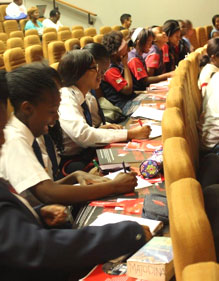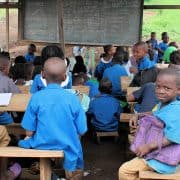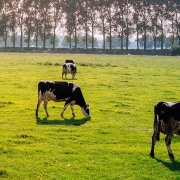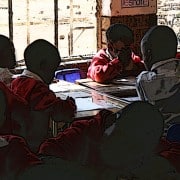|
Getting your Trinity Audio player ready...
|
 By Valencia Talane
By Valencia Talane
It has been said on numerous occasions in the lead-up to this year’s national election that it is the youth vote that will draw the most attention of political parties. Their policies should appeal to young people who are thinking about the future of South Africa, more than anyone else. For an organisation like Corruption Watch, the timing seems perfect to invest in young people with a passion to engage their peers and communities in tackling issues like corruption.
The first ever Model Youth South Africa (MYSA) challenge – a Corruption Watch initiative that encourages public engagement and debate on corruption in schools – comes to a close at the University of the Free State (UFS) on Saturday 26 April.
The pilot programme for the challenge started a month ago. With the help of Debate Afrika, an initiative by students of the UFS, Corruption Watch presented the objectives of the challenge to its participants at a workshop on schools corruption at the end of March.
MYSA drew 50 youngsters – who make up teams of five people each – from 10 schools around Bloemfontein. The challenge is open to learners from grades nine to matric.
Tackling corruption with imagination and passion
In the first of three phases, the teams had to establish media campaigns with the theme My corruption-free school. Using their schools as the centre of their campaigns, the learners had to create public education material that included social media drives. They presented their interpretation of the theme to their communities, and also solutions to fight corruption in their schools.
The teams were judged on their ability to establish and promote their own brands – they had to come up with names for their teams and create Twitter accounts where they could spread the word about their campaigns. They also had to produce one-minute videos about themselves and their corruption solutions. Watch Team Spartan's video, Team Unorthodox's video, Team Scythe's video, Team Titans' video, and Team Djembes' video.
Next up was the essay phase of the contest – which ran under the theme Corruption: a legal or moral issue? The teams were asked to produce policy essays that expand on whether they view corruption as a moral or legal issue, and substantiate their points along the way. Beyond the written work, the teams were to be judged on how well they engaged their constituencies on the topic discussed.
For the third and final phase, which takes place on Saturday, two members of each team are to participate in a parliamentary-style debate that tackles the issue of punishment for corruption. Each pair will present their team’s position on whether corruption in schools should be reprimanded through capital punishment.
A panel of adjudicators will assess the teams on their presentation style, the content of their speech and whether or not their strategy going into the debate was well structured and thought through.
A focus on Free State schools
Corruption Watch’s schools campaign takes a special interest in the Free State. It is from this province that the highest number of school corruption reports has emerged since the launch of the campaign at the beginning of the 2013 school year.
Ronald Menoe, the organisation’s campaigns and stakeholder relations manager, has overseen several initiatives in the Free State that aim to raise public awareness and encourage engagement from education authorities. Besides the MYSA challenge, Menoe has also run a media campaign with local media, including community radio stations. The message from Corruption Watch has been that of bringing complainants and authorities together to help achieve solutions for the province.
"One reason for approaching the provincial department was for Corruption Watch to build good relations, and work with them and not against them," said Menoe after a recent meeting with the provincial education department.






